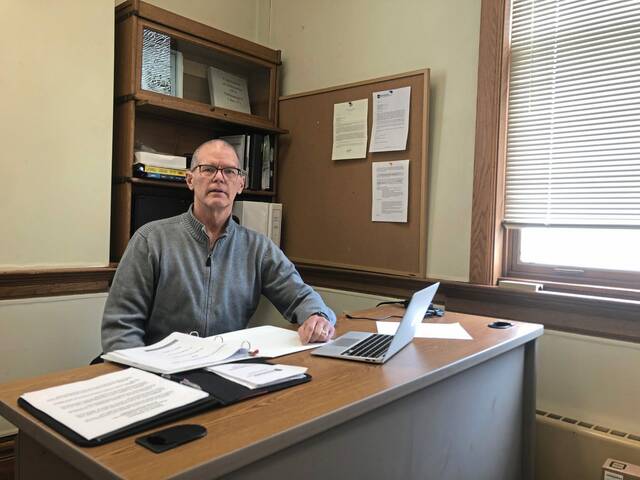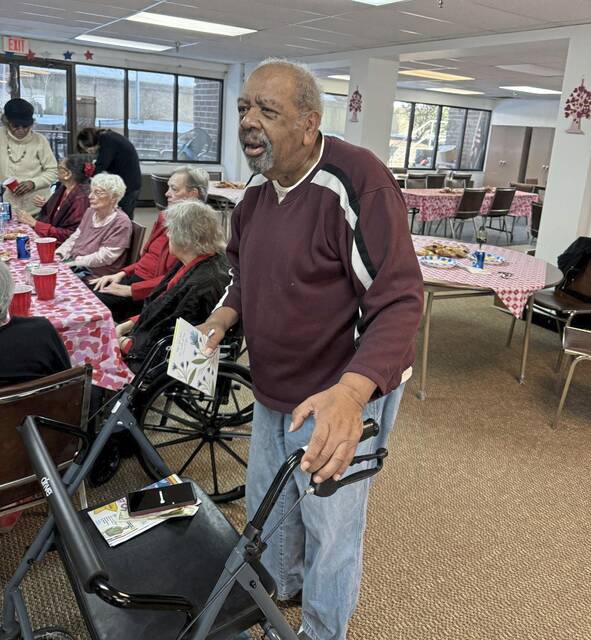Army veteran and former Boy Scout Michael Mullins believes he is prepared for his next opportunity.
The retired lieutenant colonel and certified registered nurse anesthetist was recently named Sewickley’s new emergency management coordinator.
Hailing from Champaign, Ill., Mullins served in active duty from 1975 through 1978, and was in the reserves from 1991-2008.
“I’ve been on call for the military as far as being in the reserves,” he said. “I’ve been on call for the hospital, and this is just another on-call job. If I do get called to do it, then you just go in and do the work.”
He lived with his wife, Cynthia, for about 20 years in Virginia before settling in Sewickley in 2001.
“This is a great place to live,” he said. “We really love it, and we’re not going anywhere.”
Mullins said he was only overseas once, a deployment in Iraq in 2003. Mullins was part of a forward surgical team that would treat the battle wounded and stabilize them for transport.
“The hospital was like 300 miles away,” he said. “When an army’s moving, it moves fast. We ended up in Baghdad. If anybody got hurt, they brought them to us.”
Mullins would take those skills into civilian life and work as a CRNA at various hospitals for UPMC and Allegheny Health Network including Peters Township Surgery Center and Allegheny General Hospital. He retired from nursing in 2017.
Mullins would be the point person if there would be any major flooding, landslides, technological disasters, fires or other emergencies impacting a lot of residents.
He would ensure firefighters, police and other responders have the resources they need to help mitigate the situation, as well as do the follow-up paperwork to seek any county, state or federal relief.
“Basically there’s an all-hazards kind of philosophy for the EMCs,” Mullins said. “If there’s an emergency, you’re probably going to need the same thing generally for all the emergencies. You’re going to need food, shelter, evacuation, resources and all that kind of stuff. The planning is specific.”
The job is all about prevention, mitigation, preparedness and response; all of which Mullins said he has experience in and training for.
He said the military and nursing prepared him for “dealing with nonstandard situations.”
“In combat, you don’t know what you’re going to get in to, so you prepare for everything,” Mullins said. “With (emergency management), you don’t know what kind of emergency’s going to happen so you prepare for everything.
“From all of my various duties and responsibilities, I’m very comfortable navigating bureaucracy. Part of this is to be a liaison to PEMA and FEMA. Both of those organizations have a lot of paperwork.”
Mullins has an associate’s degree in nursing from Parkland College in Illinois, a bachelor’s degree in professional arts from St. Joseph’s College of Maine and a master’s degree in anesthesia from Virginia Commonwealth University School of Medicine.
Helping people was ingrained in Mullins’ makeup as a youngster growing up in the Praire State.
“I was the kid that carried the first-aid kit when I was in the Boy Scouts,” he said. “I just kind of gravitated toward that. I’ve always been taking care of somebody.”
Formal appointment
Council unanimously voted to name Mullins emergency management coordinator at its March 8 meeting.
Mullins’ appointment to the volunteer position was also approved by Gov. Tom Wolf’s office, as per state law.
Wolf outlined the importance of emergency management coordinators in his letter to Mullins.
“Unfortunately, disasters do occur in Pennsylvania,” the letter read. “Many communities are vulnerable to severe weather conditions, as well as transportation and industrial accidents that could impact residents. As one of the most flood-prone states in the nation, it is important that we work together to reduce the community impact of flooding to the degree possible.
“We must also work with community leaders to ensure that responsible land use decisions respect the potential for disasters; with residents to ensure that property is protected through adequate insurance; and with emergency responders to ensure that they are equipped and trained for conditions which may test their resources and capabilities.”
It is also state law that every town in Pennsylvania have an emergency management coordinator.
Training and teamwork
Matt Brown works with all coordinators in Allegheny County’s 130 communities as chief of emergency services and Allegheny County EMC.
“We pull them together at least four times a year for our emergency management training,” Brown said. “There’s much more training we offer to them, but at least four times a year they meet with us. It’s a good cooperative group. So when we have those major disasters, or a community has a major disaster, we can call upon each other to help support that community. That emergency manager is not on their own … Planning and preparedness are equally important to a response for a disaster. It is a very important position and can be very helpful to a community.”
Brown said every EMC candidate goes through a background check and a screening process before they are acknowledged by the state. They also have to complete at least 12 training courses.
“It creates a level of standard because (EMCs) are (part of) the lowest form of government,” Brown said. “It connects them through to the county, then the county to the state and the state up to the FEMA level. The standards are similar across the board.”
Emergency disaster preparedness includes municipalities adopting a hazard mitigation plan and an emergency plan. They are required in order for communities to receive federal assistance, Brown said.
Brown said he could not recall a disaster being declared last year. There were at least four disaster declarations due to flooding in 2018 and statewide disasters were declared in 2019 and 2020 for the opioid crisis and in 2020 due to the pandemic.
An emergency disaster was declared in January due to the Forbes Avenue bridge collapse.
Mullins said he takes great pride in his appointment and for council’s support.
Council vice president Julie Barnes said Mullins’ training and dedication to helping others made him an easy choice for the position.
“I am confident in Michael because his military experience has trained him to be effective in high-stress situations,” Barnes said via email. “Hopefully we will never need his services, but if we do, we’ll be in capable, conscientious hands.”
Mullins took over for Jed VonHofen, who resigned as coordinator earlier this year. VonHofen was appointed to the position in January 2019.
One of his hobbies besides helping people is aquatic filmmaking.
His wife, council president Cynthia Mullins, gave him a GoPro Hero 4 in 2015 and he has been documenting snorkeling trips ever since.











